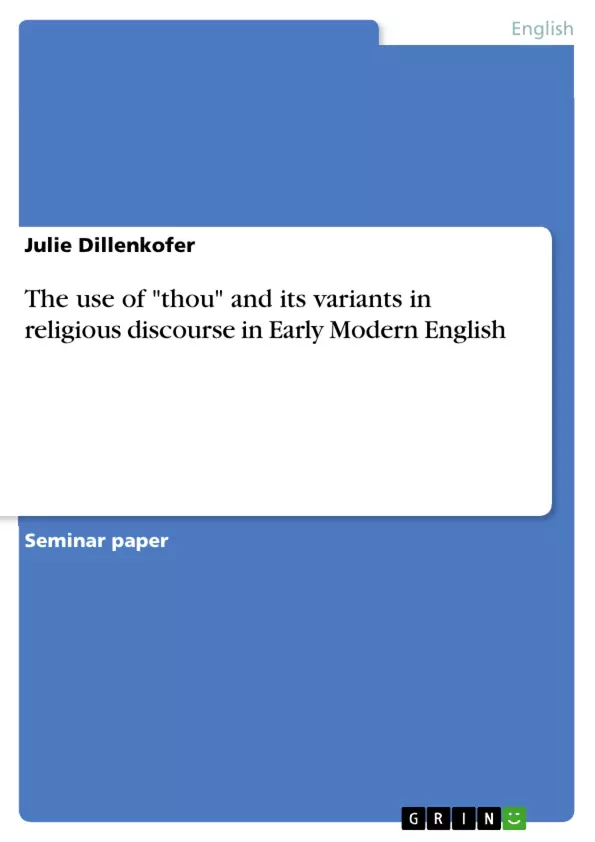"You" is an unusually versatile personal pronoun; it is “used to address two or more persons, animals, or personified things” and "thus" indicates the nominative and accusative in both singular and plural. However, you has not always been the only second person English pronoun. In Old and Middle English, there were various pronouns differentiating among gender, person, case, number including dual number. By the time period of Early Modern English, the number of pronouns was restricted and - eventually - three different forms came to be used as the nominative second person pronoun: you, ye and thou (alternative spelling: thow). In general, thou was used as the singular form, whereas ye and you were used for the plural. At the beginning of Early Modern English, ye was used as the nominative second person pronoun, while you was primarily used as the correspondent accusative form. However, in the course of the Early Modern English period, you supplanted ye as the nominative but maintained its use as the accusative form as well. On the other hand, by the end of the Early Modern English time period, you expanded its use to both the singular and the plural form and has remained that way ever since (cf. Barber 1997; Görlach 1993; Nevalainen 2006).
Table of Contents
- Introduction
- The use of thou and its variants in religious discourse in Early Modern English
- The use of thou and its variants in Early Modern English
- The Helsinki Corpus of English Texts
- The use of thou and its variants in the Bible
- The use of thou and its variants in sermons
- A comparison of thou and its variants in the Bible and sermon texts
- Conclusion
Objectives and Key Themes
This term paper examines the use of the second person pronouns you, ye, and thou in Early Modern English religious discourse. It specifically focuses on biblical and sermon texts, analyzing the context and usage of these pronouns across various time periods (1500 to 1710). The paper aims to determine if a status distinction exists within Early Modern English religious discourse and how the use of these pronouns evolved until you became the dominant form.
- The development of the second person pronouns you, ye, and thou in Early Modern English.
- The use of these pronouns in biblical texts.
- The use of these pronouns in sermons.
- A comparative analysis of pronoun usage in the Bible and sermon texts.
- The role of status distinction in pronoun choice within Early Modern English religious discourse.
Chapter Summaries
The introduction provides background information on the development of second person pronouns in English, highlighting the emergence of you, ye, and thou as distinct forms in Early Modern English. The paper's research objectives and methodology are also outlined.
Chapter 2 focuses on the use of thou and its variants in Early Modern English. It begins by detailing the conventional usage of these pronouns during this period and their connection to social relationships and emotional expression. The chapter then delves into the analysis of thou and its variants within the Helsinki Corpus of English Texts, particularly examining their occurrences in biblical and sermon texts from the first, second, and third periods of Early Modern English. This analysis explores the context, usage patterns, and potential distinctions between these pronouns across various texts and time periods.
Chapter 2.1 examines the use of thou and its variants within the Bible, analyzing their occurrences in both the Old and New Testaments across the first and second Early Modern English periods. This analysis explores the consistent use of thou as the singular form, regardless of social status, and examines the use of ye and you as plural forms, with a particular focus on any deviations from conventional usage. The chapter concludes with a discussion of the specific context and potential interpretations of those deviations.
Chapter 2.2 provides a description of the Helsinki Corpus of English Texts, detailing its content, scope, and relevance for the research project. The specific text samples selected for analysis are identified and described, providing context for the subsequent analysis of pronoun usage.
Chapter 2.3 examines the use of thou and its variants in Early Modern English sermons, analyzing their occurrences in texts from the first, second, and third periods of Early Modern English. This analysis explores the consistent use of thou as the singular form, but highlights the occasional use of thou in the plural, suggesting potential alternative interpretations. The chapter concludes with a discussion of the specific context and potential interpretations of these instances, exploring potential errors or stylistic choices.
Chapter 2.4 compares the usage patterns of thou and its variants in both the Bible and sermon texts, highlighting the consistent use of thou as the singular form in biblical texts, but observing more instances of variation and potential errors in sermon texts. This comparison suggests that language and its usage may develop more rapidly in speech than in writing.
Keywords
Early Modern English, second person pronouns, thou, ye, you, religious discourse, Bible, sermons, status distinction, pronoun evolution, Helsinki Corpus of English Texts.
- Citation du texte
- Julie Dillenkofer (Auteur), 2012, The use of "thou" and its variants in religious discourse in Early Modern English, Munich, GRIN Verlag, https://www.grin.com/document/305608




